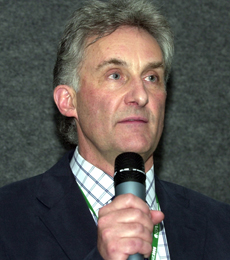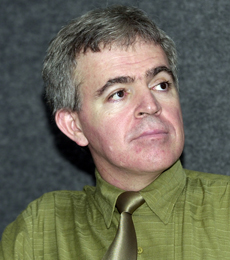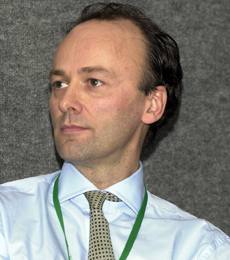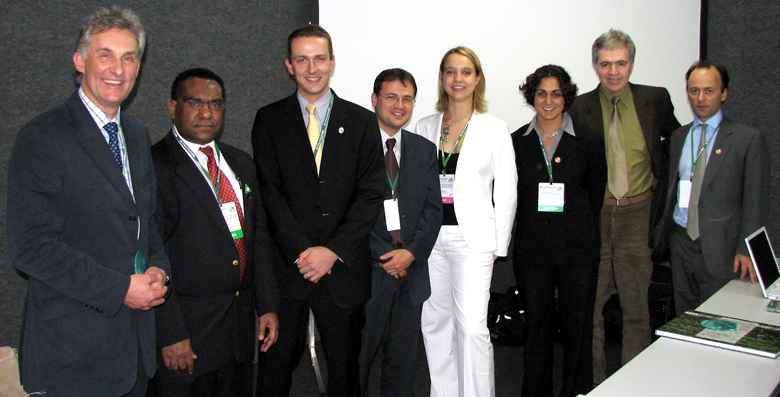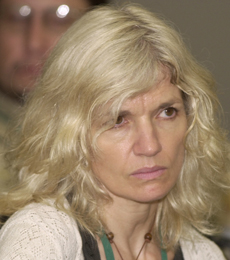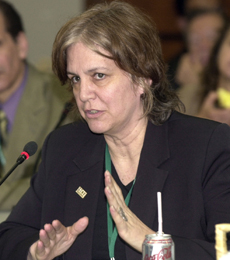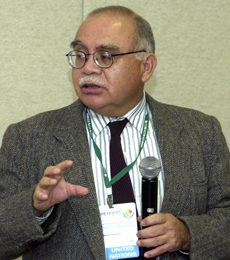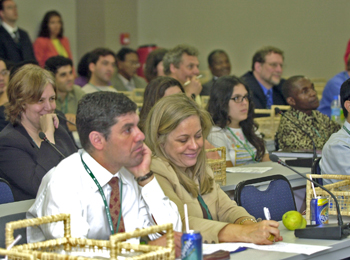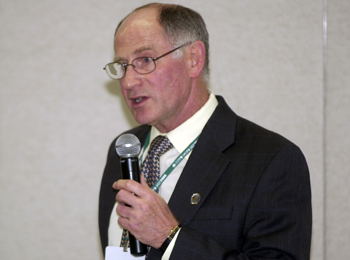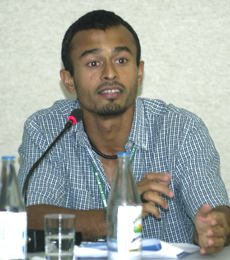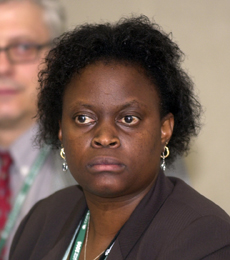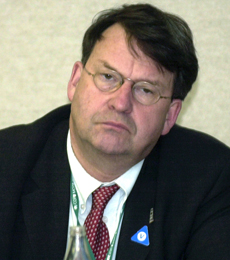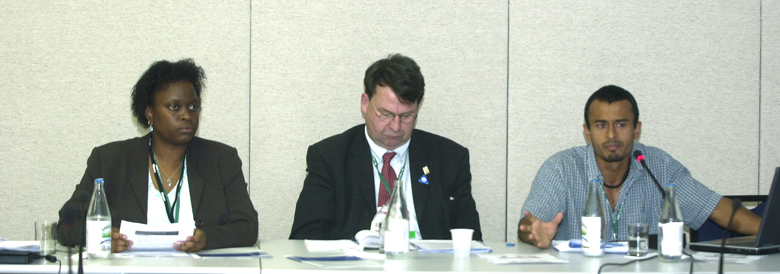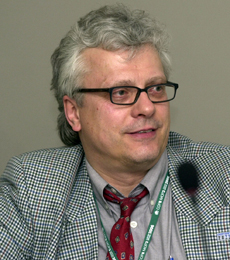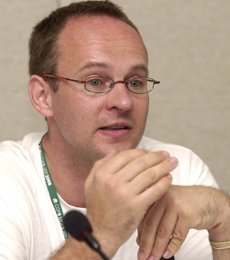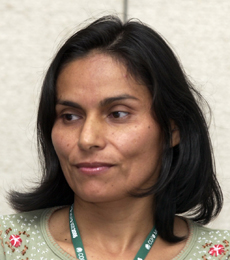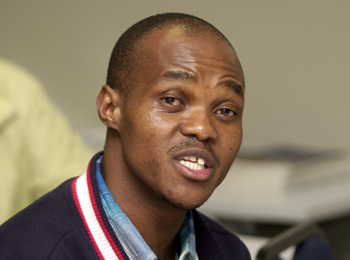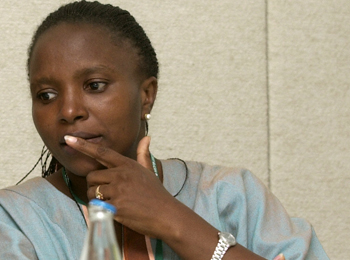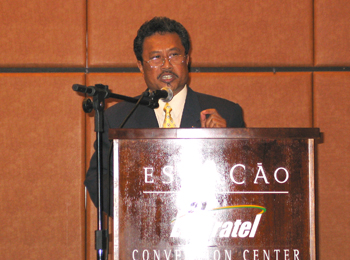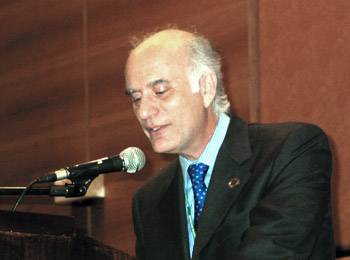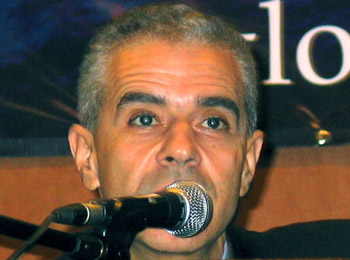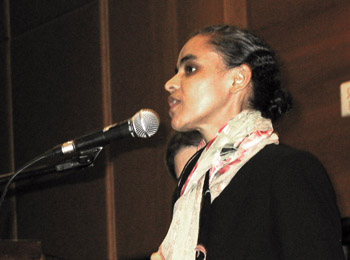 |
||
|
published by IISD, the International Institute for Sustainable Development
in cooperation with the CBD Secretariat |
|||
|
A Special Report on Selected Side Events at CBD COP-8
|
|||||
| 20-31 March 2006 | Curitiba, Brazil | |||||
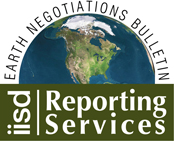 |
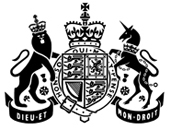 |
||||
 |
|||||
|
United Kingdom Foreign & Commonwealth Office
|
|||||
Events convened on Tuesday, 28 March 2006
|
Whole Forest Observatories – An International Network for Monitoring Canopy Biodiversity and Global Climate Change Presented by Global Canopy Programme (GCP) |
|||
|
Richard Barlow, UK Foreign and Commonwealth Office, said that sustainable development is a strategic priority for the UK Government, stressing support for the GCP. Antonio Nobre, Instituto Nacional de Pesquisas da Amazônia (INPA), Brazil, depicted the Amazon as a biotic regulator and described its biological and chemical functions and the relationship between biosphere and atmosphere in regulating water, sequestering carbon and providing other ecosystem services for humanity. Nobre detailed how the Amazon’s regulation of the climate is dependant upon its “functional” biodiversity. He said the biodiversity-climate connection is a “brave new world”, and that the rainforest functions as an “open liver”, cleaning the air. Nobre added that rainfall is not the only regulating function of the rainforest, it can also drag inland moisture from the surrounding ocean, keep atmosphere clean from excess dust that could upset the cloud and rain formation dynamics, and return precipitated water into the atmosphere. Andrew Mitchell, GCP, introduced the proposed Whole Forest Observatory (WFO) Network, expected to run from 2007/8 to 2012, which will monitor how forest canopies interact with the atmosphere, affecting climate change, and how “biodiversity meets the atmosphere.” Mitchell recalled the proposal made by Papua New Guinea at the UNFCCC Kyoto COP/MOP-1, suggesting that countries should be compensated for reducing deforestation rates, emphasizing that the GCP is designed to demonstrate how “biosphere-atmosphere hotspots,” a new concept he proposes, provide ecosystem services of high economic value. He stressed that the WFO is essentially about “Life, Atmosphere and People,” indicating the crisis of values between humanity and biodiversity and our responsibility to come up with creative mechanisms to stop biodiversity loss. He indicated that Brazil, Malaysia, India, Ghana, Madagascar and China are partner countries for the WFO, with the UK Government fostering these partnerships. Hylton Philipson, GCP, stressed that the only way to stop deforestation is to put a cash value on ecosystem services provided by tropical forests, transferring benefits back to local governments and communities. He suggested some alternatives to fund conservation: development of carbon markets to avoid deforestation and land conversion into crops and pastures; involvement of the Organization of the Petroleum Exporting Countries, whose income has doubled in the past two years, and insurance companies, who have lost billions with from the impact of natural disasters due to climate change; air travel; and soya producers, who need rainfall for their plantations. Nigel Sizer, UNEP/GEF, indicated that the GCP project is a high priority for the GEF portfolio. |
|||
|
|||
|
An interactive event with Dr Leonard Good, CEO and Chair, Global Environment Facility Presented by the Global Environment Facility (GEF) |
||||
|
Leonard Good, GEF, opened the event by highlighting two of the macro directions now being emphasized in the GEF’s new policy document: the first is the need for GEF to take an integrated approach and work in a synergized way across conventions for which it is the financial mechanism, using focal points established for biodiversity, climate change, international waters and land degradation. The second, the need to consider the impact of projects on local and indigenous populations in assessing global environmental impacts, identified by a recent GEF local benefits study. Good then responded to questions from participants, with some specific issues addressed by Mario Ramos, GEF Global Biodiversity Division, and Frank Pinto, UNDP/GEF. On GEF’s approach to customary land rights, Good emphasized it is primarily the conventions’ financial mechanism, although it operates in accordance with certain guiding principles for project implementation. On incorporating development issues into GEF thinking, he emphasized GEF’s mandate is to provide global environmental benefits. He said that GEF considers development issues in its project work, but noted that this cannot be the sole purpose. One participant called on GEF to maintain its focus on environmental results and not to allow funds to be diverted following the adoption of the MDGs. Good replied he did not see such diversion happening but more a recognition of the interactions and synergies that narrowly-designed projects cannot address. In response to a question about the GEF approach to facilitating the leveraging of external funds to ensure project sustainability, Good said that sustainability is a key element of project assessment, and Pinto added that ensuring sustainability is often approached by leveraging funds from UNDP specific-focus programmes and from across the UN system once a project is up and running. On the ability of CITES to access GEF funding, Good said that projects that come directly under the heading of conventions for which it is not the financing mechanism are not funded, but noted that he is also concerned not to miss synergistic opportunities. Ramos further referred to current programme synergy activities being considered and developed jointly by CBD and CITES Secretariats. When questioned as to how the GEF perceives NGOs, Good said that NGOs are well represented in the GEF process, and Pinto referred to the GEF Small Grants Programme where projects are all designed and run by NGOs. |
||||
|
|||
|
Capacity Building Initiative for Africa Presented by German Technical Cooperation (GTZ) and the Netherlands Ministry of Foreign Affairs |
||
|
Hans Wessels, Ministry of Foreign Affairs, the Netherlands, recalling the CBD COP 7 decision on the elaboration of an international regime for Access and Benefit Sharing (ABS), explained that with German and Dutch assistance a regional ABS Capacity Needs Assessment workshop was convened to address, inter alia, bioprospecting and access to transboundary genetic resources.
Anne Angwengy, National Environment Management Authority (NEMA), Kenya, gave an overview of the workshop, highlighting various bioprospecting examples such as the commercialization of Devil’s claw, used as an anti-inflammatory agent which has enabled communities in Botswana to improve their living standards despite the absence of an ABS agreement. She said in Ethiopia, an ABS agreement regarding teff, a cereal crop, has been concluded between the Ethiopian Institute for Biological Conservation and a Dutch commercial breeder. She added that the participants at the workshop called for clear-cut definitions and the avoidance of duplication of regional capacity building efforts in addition to the need for harmonized ABS regulations. Kabir Bavikatte, Protimos, elaborated on the outcome of the needs-based questionnaire that was distributed to participants at the recent Ad hoc Open-Ended Working Group on ABS in Grenada. Explaining that 17 out of 52 African countries participated in the questionnaire and called for, inter alia, the development of policies and national legislation on intellectual property rights (IPRs), monitoring of ABS cases and genetic resource inventories. In the ensuing discussion one participant noted that Devil’s claw had been commercialized in the 1950’s, and raised the issue of retrospective ABS. Another observed that in Africa lack of community cohesion has allowed inappropriate access without prior informed consent based on mutually agreed terms. |
||
|
|||
|
Community Action for the CBD and MDG Agendas: Challenges, Gaps and Opportunities Presented by Community Taba, the UNDP Equator Initiative and GTZ |
||||
|
Sean Southey, UNDP, explained that the Community Taba, a dialogue platform facilitated by the Equator Initiative, seeks to place local communities at the heart of sustainable development and biodiversity conservation. Participants watched a documentary entitled “Community Voices” which highlights the contribution of local voices to global dialogue and policy formulation and affirms the role of local communities in achieving the MDGs, emphasizing their need for empowerment. Participants shared experiences relating to how the Community Taba dialogue space enables them to interact with their governments and presents opportunities to become involved in national environmental policy formulation. John Herity, IUCN, explained that the dialogue space provided by IUCN at the World Summit on Sustainable Development had been a launching pad for policy impact, adding that the Community Taba enables local communities to interact with decision makers, and was particularly empowering for indigenous people. Andreas Drews, GTZ, presented an MDG poster template to be used to communicate how biodiversity conservation helps deliver on the MDGs. He noted that when implementing biodiversity projects MDG objectives can also be achieved simultaneously. Isabel Soares de Souza, Mamirauá Institute for Sustainable Development, explained that the poster illustrates how biodiversity conservation projects are helping to implement the MDGs in Mamirauá, a Sustainable Development Reserve in Brazil. Participants highlighted challenges and opportunities in engaging local peoples in delivering on the MDGs, including the need to devise activities to involve local people in all aspects of environmental policy and the need to identify key enabling elements such as process transparency. |
||||
|
|
|||
|
Islands, marine biodiversity and livelihoods: a Global Island Partnership Co-sponsored by CBD, TNC, WWF, South Pacific Regional Environment Programme (SPREP),International Coral Reef Action Network (ICRAN), the Government of the UK, the Government of Italy/IUCN, CI, Birdlife/Royal Society for the Protection of Birds (RSPB), Palau Conservation Society, Conservation Society of Pohnpei, Micronesia Conservation Trust |
||
|
The President of Palau, Tommy Remengesau, noted the relevance of the CBD work programme on island biodiversity and the Micronesia Challenge, as islands are a “test case” for the seriousness of the global community in finding responses to stem the tide of biodiversity loss, indicating that half of the species that have become extinct were located on islands.
Highlighting the Micronesia Challenge as a key strategic partnership for dealing with developmental and conservation challenges faced by islands states, H.E. Redley Killion, Vice President of the Federated States of Micronesia, indicated that such initiatives and the work programme on island biodiversity are mutually reinforcing. Marina Silva, Minister of the Environment, Brazil, welcomed the opportunity to exchange experiences with the island states. She underscored the fragility of islands, saying that large countries like Brazil are also fragile, as are the multilateral environmental agreements. Ann David-Antoine, Minister of the Environment, Grenada, announced the commitment by Grenada to conserve at least 25% of all near shore marine resources and at least 25% of all terrestrial resources by 2020. Saying that nationalism can be good, Chris Carter, Conservation Minister of New Zealand, said New Zealand's success in conservation is based on the fact that they have tapped into the population, creating an identity founded in the uniqueness of the land, creating ownership. Martin Puta Tofinga, Minister of Environment, Lands and Agricultural Development, Kiribati, declared the Phoenix Islands as a marine protected area, and said that they are also being considered for World Heritage Site Status. Ahmed Djoghlaf, CBD Executive Secretary, emphasized the importance of the proposed work programme on island biodiversity to address vulnerability and degradation of islands ecosystems. |
||
|
||
|
Click the above button to go back to our ENB main coverage
|
||
|
|
|
|
|
||
|
